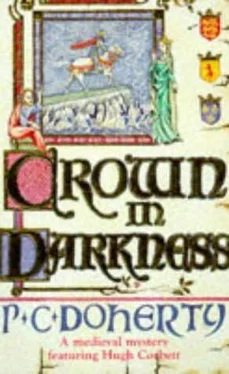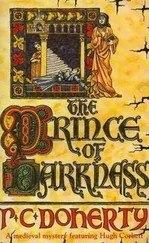Paul Doherty - Crown in Darkness
Здесь есть возможность читать онлайн «Paul Doherty - Crown in Darkness» весь текст электронной книги совершенно бесплатно (целиком полную версию без сокращений). В некоторых случаях можно слушать аудио, скачать через торрент в формате fb2 и присутствует краткое содержание. Жанр: Исторический детектив, на английском языке. Описание произведения, (предисловие) а так же отзывы посетителей доступны на портале библиотеки ЛибКат.
- Название:Crown in Darkness
- Автор:
- Жанр:
- Год:неизвестен
- ISBN:нет данных
- Рейтинг книги:4 / 5. Голосов: 1
-
Избранное:Добавить в избранное
- Отзывы:
-
Ваша оценка:
- 80
- 1
- 2
- 3
- 4
- 5
Crown in Darkness: краткое содержание, описание и аннотация
Предлагаем к чтению аннотацию, описание, краткое содержание или предисловие (зависит от того, что написал сам автор книги «Crown in Darkness»). Если вы не нашли необходимую информацию о книге — напишите в комментариях, мы постараемся отыскать её.
Crown in Darkness — читать онлайн бесплатно полную книгу (весь текст) целиком
Ниже представлен текст книги, разбитый по страницам. Система сохранения места последней прочитанной страницы, позволяет с удобством читать онлайн бесплатно книгу «Crown in Darkness», без необходимости каждый раз заново искать на чём Вы остановились. Поставьте закладку, и сможете в любой момент перейти на страницу, на которой закончили чтение.
Интервал:
Закладка:
"The situation, however, is still perilous. No woman has ever before become the ruler of Scotland and there are mutterings about the old Celtic tradition that when a king died the closest male relative took over the reins of power. This is now happening in Scotland and the kingdom is beginning to veer to one or the other of the two powerful families with such claims to the throne. These are the Comyns and the Bruces who can both reckon amongst their members males of the royal blood, for each claim the throne by descent from David, Earl of Huntingdon, great-uncle of Alexander III and grandson of a former king. There has always been bad blood between these families but now they are like two stiff-legged hunting-hounds who circle each other with hackles raised and teeth bared, carefully eyeing each other, ready to launch into war if any move is made by their rival. The only force which separates them is the Church, the one single coherent organisation in this country which binds like mortar the different races and degrees of this nation. Two of the leading churchmen, Bishops Wishart of Glasgow and Fraser of St. Andrews, have once more summoned to Scone the Prelates, Abbots, Priors, Earls, Barons and all good men of the country to renew their fealty to the new queen over the water, the Maid of Norway. All swore, on pain of excommunication and eternal damnation, to protect and uphold the peace of the land. Their Lordships, the Bishops, have achieved their ends, setting up a regency to represent the whole Community of the Realm consisting of the Earls of Buchan and Fife, Sir James Stewart and John Comyn and, of course, the two
Bishops themselves. Three of these so called Guardians are responsible for Scotland north of the Forth and the other three, particularly Wishart, wield authority south of this line. Men accept things as they are, though they would prefer things as they should be. Despite the Council of Guardians the different lords are levying troops and fortifying castles, preparing for war if peace fails. Your Grace, the King, has personal knowledge of the Bruces. All three of them, grandfather, father and son, all called Robert, never fail to remind people that they have royal blood in their veins and a strong claim to the Scottish throne. In 1238, as your Grace may know, when there was no apparent successor to the throne the then Scottish king called his magnates together and, in their presence and with their consent, designated the House of Bruce as his heir-presumptive. This promise proved illusory when a proper heir appeared. Nonetheless, the House of Bruce, for a brief while, tasted royalty and many claim it only whetted their appetite.
"As matters stand now, the kingdom is quiet, but I will keep your Grace informed of what events occur. We are acceptable to the Scottish court, being friends of all and allies to none. We are pleased to greet the arrival of Hugh Corbett, Clerk to the Chancery, despatched north by your Chancellor. His presence at the court will be a definite aid to our mission. God save your grace. Written at Edinburgh -May 1286."
Corbett studied the document and passed it back to Benstede. 'A fair analysis,' he commented, 'on the situation of Scotland. Do you think there will be war?' Benstede shook his head. 'No, not yet. Alexander kept his kingdom strong. It would take months, perhaps a year, for such strength to seep away. A great deal depends upon the arrival of the Maid from Norway and who secures her hand in marriage. When,' he nodded slowly, 'there could be war.' Their conversation then drifted on to other desultory matters. Corbett spoke about his early life, his wars in Wales and work at the Chancery. Benstede, the only son of a worthy Sussex farmer, told of his vocation to the priesthood, his interest in medicine and his rapid promotion in the royal service. Corbett caught the reference to medicine. 'You mean?' he asked, 'that you trained in the College of Medicine?' 'Yes,' Benstede replied. 'At one time I thought my vocation was to be a surgeon or doctor. I studied for a time in Paris, Padua and Salerno.' Benstede looked intently at Corbett. 'That is why I asked earlier if you were interested in the death of King Alexander. I myself questioned the royal physician who dressed the body for burial at Jedburgh Abbey, Duncan MacAirth. It was he who told me about the injuries the King received. He is here in the casde. Perhaps I can introduce him to you.' 'Does he keep some secret about the King's death?' Corbett asked. Benstede paused. 'No,' he replied. 'Alexander died from a broken neck due to a fall from his horse. Never mind the stupid prophecies and their curses! Alexander's first wife died, his two sons died; the way he drank to forget it all and his mad rides at night to satisfy any lust, it was only a matter of time before such an accident occurred.' 'So, Alexander's death came as no surprise to his subjects?' 'What do you mean?' Benstede replied sharply. 'I mean,' Corbett began slowly, 'the House of Comyn and that of Bruce must, er -,' the English clerk paused, searching for the right words, 'must not be displeased,' he continued, 'to be provided with an occasion to advance their respective claims to the Scottish throne.' 'Be careful what you say, Corbett!' Benstede replied. 'The Comyns hardly came to court and though Bruce was close to Alexander, the late King never bothered to consider their claims to his throne. Yet,' he concluded slowly, 'there are those who now watch Bruce carefully. He wants the crown, Master Corbett, as any other man wants eternal life. But, be careful in what you say or do. The Bruces are violent and would not take kindly to what you are hinting!' Corbett was nodding in agreement when a knock at the door interrupted them and a short, dumpy figure entered. Corbett was immediately repelled. The man had a bland, vacuous face, protruding green eyes and lank, brown, greasy hair. He made signs with his hands and fingers and Corbett watched fascinated as Benstede replied using identical gestures. The man looked at Corbett and Benstede turned. 'My apologies, Master Clerk. May I introduce Aaron, a convert from another faith, a deaf mute, who can only communicate in sign language. He is my body-servant, since my student days in Italy. He has come to tell us that the feast is about to begin and we must go down immediately.' Corbett nodded and followed both the envoy and his strange companion out of the room and down to the main hall of the castle.
SIX
The banquet was really a frantic blur to Corbett. The long hall was caparisoned with cloths of Paris, cosdy arras, and ablaze with torches burning fiercely in their countless sconces along the walls. At the far end, on a dais, was a long table crowded with fierce-looking men dressed in costly ermine and sable-edged cloaks, though, from where he stood, Corbett could see the glint of armour many of them wore beneath their robes. Even so, the Council of Guardians were intent on keeping the peace; weapons were forbidden and royal serjeants-at-arms were placed in groups in the shadowy recesses of the hall. Beneath the great silver-encrusted salt bowl were long rows of tables crowded with the retainers, clerks and officials of the great lords. The noise was intense, constant chatter, voices raised in argument, an air of expectancy, even tension, as everyone pretended to be involved in what was happening around them but secretly watched the great ones at the high table.
Benstede swept through the hall and tactfully presented himself before this array of the most powerful magnates in Scotland. He also introduced Corbett who felt many of the lords were too busy to acknowledge him though he noticed Bishop Wishart of Glasgow, a wizened little man with a face as brown and as wrinkled as a shrivelled walnut, studying him intently beneath heavy-lidded eyes. There was another, a giant with steel-grey hair, piercing blue eyes and a cruel mouth. Benstede later named him as Lord Robert, the leader of the Bruce faction. He too studied Corbett intently before reverting to stare fiercely down the hall.
Читать дальшеИнтервал:
Закладка:
Похожие книги на «Crown in Darkness»
Представляем Вашему вниманию похожие книги на «Crown in Darkness» списком для выбора. Мы отобрали схожую по названию и смыслу литературу в надежде предоставить читателям больше вариантов отыскать новые, интересные, ещё непрочитанные произведения.
Обсуждение, отзывы о книге «Crown in Darkness» и просто собственные мнения читателей. Оставьте ваши комментарии, напишите, что Вы думаете о произведении, его смысле или главных героях. Укажите что конкретно понравилось, а что нет, и почему Вы так считаете.












